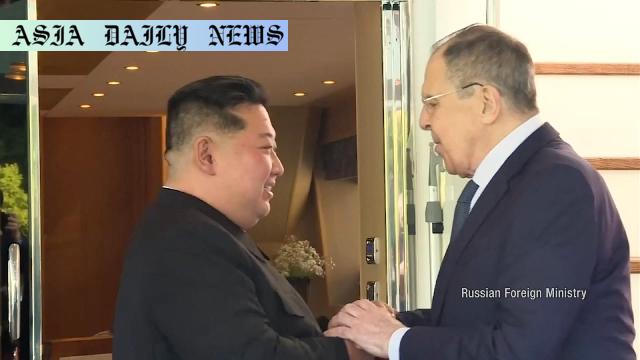Strategic Partnership: Russia strengthens military and diplomatic ties with North Korea through high-level talks and agreements.
Key Point 1: Russian Foreign Minister Sergey Lavrov met with North Korean leader Kim Jong Un to strengthen bilateral ties.
Key Point 2: Putin’s message reaffirms commitment to strategic agreements with North Korea amid growing global tensions.
Key Point 3: North Korea may deploy additional troops to Russia in a show of solidarity, highlighting their defense partnership.

Introduction to the Strategic Partnership
The recent meeting between Russian Foreign Minister Sergey Lavrov and North Korean leader Kim Jong Un in Wonsan has underscored a burgeoning strategic relationship between the two nations. This pivotal event is a testament to their commitment to strengthening bilateral ties on diplomatic and military fronts. Lavrov, bringing a message directly from Russian President Vladimir Putin, emphasized Russia’s dedication to honoring established agreements and fostering deeper collaboration in the coming future. In the face of global instability and increasing geopolitical tensions, this meeting serves as a milestone moment in redefining their alliance.
The Context of Lavrov’s Visit
Lavrov’s visit to Wonsan, North Korea, comes at an opportune time. His attendance as the first guest of a newly inaugurated seaside resort was more than a diplomatic courtesy — it symbolized a rekindled warmth in Russia-North Korea relations. Both leaders viewed the meeting as an essential move to reassert shared interests and exchange perspectives between their countries’ leadership. Lavrov’s statement, highlighting the importance of North Korea’s autonomy in implementing the strategic partnership agreement, demonstrated Russia’s respect towards Pyongyang’s decision-making authority, particularly regarding potential troop deployments.
Key Takeaways From the Meeting
The bilateral discussions focused on their comprehensive strategic partnership, including military and mutual defense agreements. Putin, through Lavrov, reaffirmed his interest in maintaining direct communication with Kim Jong Un while stressing adherence to shared objectives. This reflects a growing convergence of interests that extends beyond rhetoric into actionable pledges of support. The possible deployment of 25,000 to 30,000 North Korean troops to aid Russia highlights the tangible dimensions of this partnership amidst rising global uncertainties. Lavrov’s public defense of these measures signals Moscow’s willingness to accept North Korea’s show of solidarity, despite international scrutiny.
Implications for the Global Stage
This evolving partnership has far-reaching implications. It underscores a recalibration of alliances as Russia, facing international sanctions and isolation due to its conflict with Ukraine, turns eastward for strategic partners. North Korea’s involvement presents a defiance of international norms, particularly given the longstanding global sanctions against Pyongyang. This cooperation highlights the complexities of global politics where bilateral interests often override multilateral agreements. If further troop deployment from North Korea materializes, it will mark a significant deviation from diplomatic practices traditionally orchestrated by international oversight bodies like the UN.
The Road Ahead for Russia and North Korea
Going forward, the strategic partnership between Russia and North Korea is expected to solidify further. Mutual defense, resource-sharing agreements, and infrastructural collaboration could define the roadmap for their relations. At the same time, such close cooperation will likely invite more significant scrutiny from Western powers and other nations allied with democratic principles. Both nations seem prepared to navigate this growing criticism as they pursue a shared goal of regional dominance and stability on their terms.



Commentary
Strengthening Geopolitical Ties Amid Global Tensions
The recent meeting between Russian Foreign Minister Sergey Lavrov and North Korean leader Kim Jong Un is a significant moment in global politics. With Russia aiming to counterbalance its international isolation due to its ongoing conflict in Ukraine and North Korea seeking greater legitimacy on the world stage, this partnership stands to alter dynamics not just in Asia but globally. The reaffirmation of their mutual commitments emphasizes the strength of their alliance at a time when both nations are under increased scrutiny from Western powers.
Military Collaboration and Its Broader Implications
One of the most striking facets of this partnership is the military collaboration. The potential deployment of tens of thousands of North Korean troops to support Russia can be viewed as a bold move that defies traditional international norms. While this move may offer immediate strategic benefits to Russia, it undoubtedly raises questions about how such actions will reshape the global perception of these nations. By solidifying their defense commitments, Russia and North Korea are sending a clear message to global powers: their alliance is not to be underestimated.
Looking Beyond Diplomacy to Practical Outcomes
The implications of this partnership extend beyond mere diplomatic gestures. As both nations deal with economic limitations due to sanctions, closer economic and trade ties might be the next logical step. However, this collaboration will likely raise alarms among Western nations, potentially prompting new economic or political measures to counterbalance this growing partnership. Nonetheless, the resilience displayed by Russia and North Korea in pursuing their shared objectives illustrates their determination to assert themselves in an increasingly fragmented world.